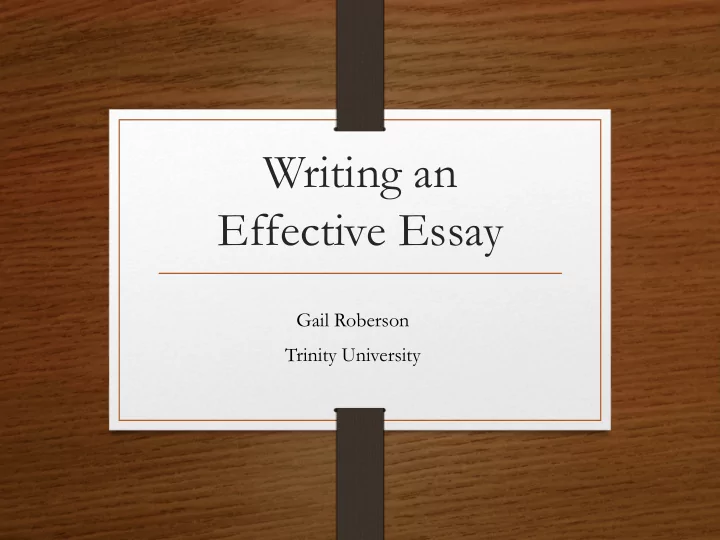

Writing an Effective Essay Gail Roberson Trinity University
Every essay fulfills two basic needs: Who is this student? What is their writing style/ability?
Who are you? • What/who are the largest influences in your life? • What are your most distinguishing personality traits? • What are your beliefs? Guiding principles? • What are some of your most significant moments?
Personal Statement Be honest • Show your personality • Have fun! • Know your audience, especially with… • controversial topics • anything (overly) religious or political •
What is your writing style? Find your voice. • If it sounds awkward when you read it aloud, • change it. Pay attention to grammar, detail, and tone. •
Essay Tips • The introduction can make it or break it • Be creative. It isn’t the ‘what’ but the ‘how’ that matters • Everything you write should have a purpose • Include something that we won’t see elsewhere in your application • Have a power statement • Grammar and spelling matter • Proofread and proofread again
Essay Topics (Apply Texas) • What was the environment in which you were raised? Describe your family, home, neighborhood, or community, and explain how it has shaped you as a person. • Most students have an identity, an interest, or a talent that defines them in an essential way. Tell us about yourself. • You’ve got a ticket in your hand–Where will you go? What will you do? What will happen when you get there?
Essay Topics (Common App) Some students have a background, identity, interest, or talent that is so meaningful they believe their • application would be incomplete without it. If this sounds like you, then please share your story. The lessons we take from obstacles we encounter can be fundamental to later success. Recount a time • when you faced a challenge, setback, or failure. How did it affect you, and what did you learn from the experience? Reflect on a time when you questioned or challenged a belief or idea. What prompted your thinking? • What was the outcome? Describe a problem you've solved or a problem you'd like to solve. It can be an intellectual challenge, a • research query, an ethical dilemma - anything that is of personal importance, no matter the scale. Explain its significance to you and what steps you took or could be taken to identify a solution. Discuss an accomplishment, event, or realization that sparked a period of personal growth and a new • understanding of yourself or others. Describe a topic, idea, or concept you find so engaging that it makes you lose all track of time. Why does • it captivate you? What or who do you turn to when you want to learn more? Share an essay on any topic of your choice. It can be one you've already written, one that responds to a • different prompt, or one of your own design.
Examples
Example A Life without language: all the ideas, thoughts, and emotions present, but unable to be expressed. This is how I picture my grandfather when he first immigrated to America with my grandmother and their nine children. Lost, he wanders around, hoping to bump into someone who can understand him. He raises his own children to know Vietnamese and hopes his future grandchildren would also be connected to the language of their ancestors. But when I form my lips into unnatural shapes to speak these words, they come out pathetically. I cannot speak Vietnamese.
Example B I hear the click of heels approaching, sharp staccato clicks, and I quickly bury my face in my mother’s dress. The fabric smells like our apartment and fresh arepas. The heels greet my mother and let out a warm, bright laugh that immediately melts my fear. I am scooted in front of my mother, my shoulders reaching just above her knees, and face those clicking shoes.
Example C I was born with an extra hand—kind of. Anatomically, I’m normal. I don’t have a third arm protruding from the center of my chest or anything of the sort. I do, however, have the unusual ability to use both hands equally well. When I was little, I thought of my ambidexterity as a fun trick. I always liked to play with people when learning a new skill: “Okay, now are you right or left handed?” “I don’t know,” I would answer with a comical smile. Or even better, “Pick one for me.”
Questions? Gail Roberson Gail.Roberson@trinity.edu
Recommend
More recommend